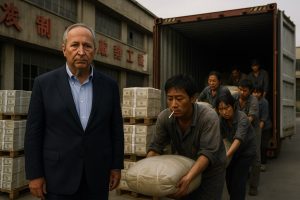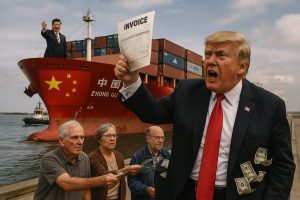China has increased tariffs on U.S. goods from 84% to 125%, effective Saturday, in response to President Donald Trump’s high tariffs on Chinese imports, which now stand at 145%. The announcement came from China’s State Council Tariff Commission as Hong Kong markets closed, according to a statement reported by Reuters on April 11, 2025. This move deepens a major trade war between the U.S. and China, with both sides showing no signs of backing down.
China’s government also said it will stop reacting to further U.S. tariff hikes. Instead, it’s turning to other measures, like limiting Hollywood movie imports, slowing shipments of rare earth minerals, and letting the yuan weaken to make its exports cheaper. The State Council Tariff Commission stated that U.S. goods face “no market acceptance” in China at current tariff levels, and further U.S. increases will be ignored, per the same Reuters report. The Commerce Ministry added that more U.S. tariffs would be “economically senseless” and mocked them as a potential “joke” in global economic history.
President Trump has tried to pressure China by pausing new tariffs for 90 days on countries that don’t retaliate, a tactic to isolate Beijing and push for a trade deal, according to a Bloomberg article from April 10, 2025. However, no talks are happening. Zhiwei Zhang, chief economist at Pinpoint Asset Management, told CNBC on April 11, 2025, that both sides have likely reached the limit on tariff increases, as they’re no longer practical.
The trade war is already hitting hard. Apple and Tesla sales forecasts in China are down, and supply chains are struggling. A Wall Street Journal report from April 10, 2025, noted Amazon canceled orders from Chinese sellers, and Walmart dropped its financial outlook due to tariff impacts. Goldman Sachs analysts cut China’s 2025 GDP growth forecast to 4.0% from 4.5% and 2026 to 3.5% from 4.0%, expecting Beijing to boost stimulus to soften the blow, per a note published April 11, 2025.
There’s also talk that China might be selling U.S. Treasury bonds to fight back financially, though nothing is confirmed. China’s Commerce Ministry said it’s open to talks, but it’s ready to “fight to the end” if needed, according to Xinhua News on April 11, 2025. Meanwhile, U.S. Treasury Secretary Scott Bessent called China’s economy “imbalanced” and said the trade war hurts them more, as quoted in a Financial Times article from April 9, 2025.
With no clear path to peace, businesses and markets are feeling the strain. The big question is how long both countries can keep this up without bigger economic damage.












Be First to Comment